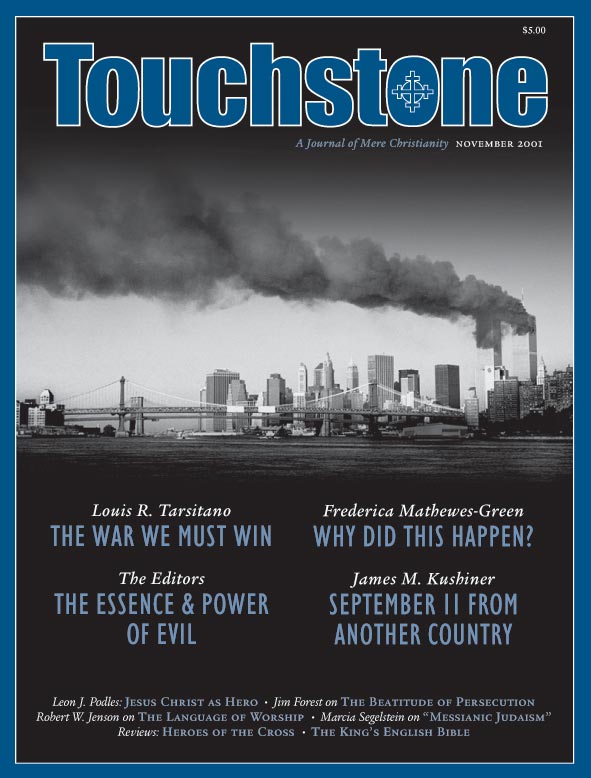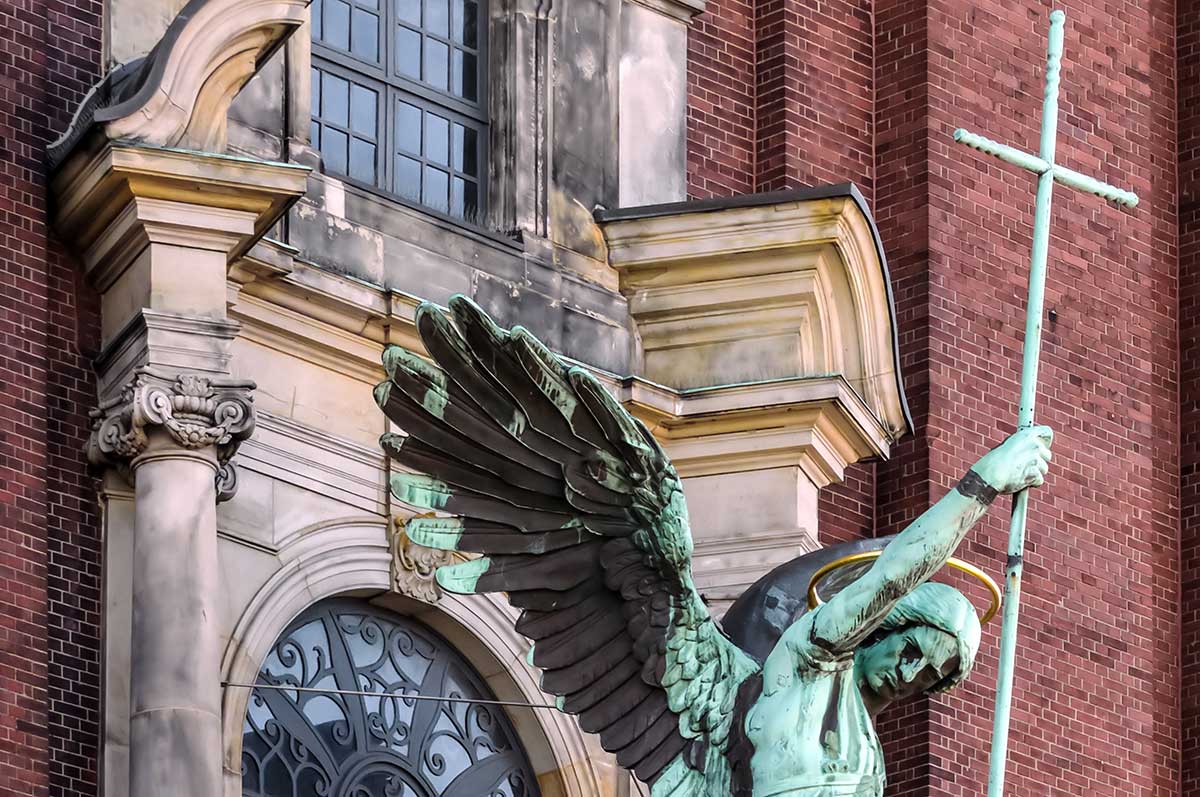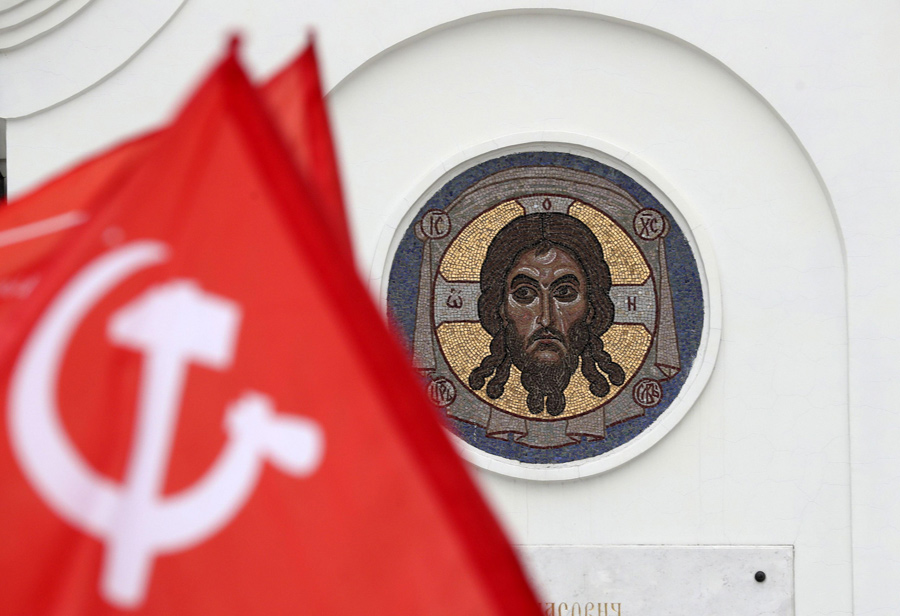Why Did This Happen?
Frederica Mathewes-Green on the Questions Raised by September 11
On the day after the tragedy I drove through Washington, D.C., surprised to find it uncongested and tranquil. I went past the battered Pentagon, where cars crept along the interstate at a few miles an hour as people craned their necks to see and comprehend our national wound. A few miles further, down among the suburban office towers, is a tiny old white clapboard church.
I stepped inside the cool interior, which was dimly lit and covered on walls and ceiling with paintings of Christ and the apostles, of biblical figures and heroes from long ago. I took a seat to wait for my spiritual father and looked around. I saw faces of men and women who had known suffering, much more severe than what I had ever experienced, even as rocked as I felt just then. They stood serene around the walls, many holding symbols of victory.
Fr. George Calciu came out from beside the altar and greeted me. He is a small, resilient man, unusually vigorous for his 76 years. His hair and beard are thick and white, and his face is permanently creased with the marks of indomitable good cheer. Cheerfulness is an unlikely attribute, given his story. In his native Romania, Fr. George challenged the Communist authorities repeatedly and forcefully, with a courage that defied self-preservation. He was confined in brutal prisons, subjected to brainwashing, and formed a lifelong friendship with a fellow prisoner, the late Richard Wurmbrand, author of Tortured for Christ.
Today the first thing he asked me was, “Why do you think that happened yesterday?”
I was stumped for a minute. I hadn’t thought of exactly that question. I said “I don’t know.”
Fr. George said, “It was the punishment of God.”
Something Not Thought Of
Well, there’s something I hadn’t thought of. Though I wondered why I hadn’t; I’ve just finished an intensive study of the fall of Jerusalem in A.D. 70, and knew that the Jews have always seen even that brutal and sacrilegious tragedy as divine retribution for their sins. In fact, that seems to be the Old Testament pattern; any time Israel suffered a military defeat, they responded with repentance. It didn’t replace other strategic responses but was an indispensable companion.
This isn’t just an Old Testament phenomenon. When people told Jesus that Pilate had killed worshipers at the Temple, he responded, “Unless you repent, you will all likewise perish” (Luke 13:3). There seems to be a biblical pattern here: National suffering should bring about repentance.
I have often wondered what might return our sick culture to health. I’ve sometimes felt overwhelmed at the ugliness of America’s spiritual condition, at 40 million children killed by abortion, at the promotion worldwide of sexual promiscuity and materialism, the contempt of God, the spreading infection of American culture.
I’ve often wondered what might turn us around. Everything moves in cycles, and some sick cultures do return to health; it can happen in a generation. But I have never heard of a historical example that wasn’t inaugurated by catastrophe. Healing is the fruit of repentance, and repentance comes in the wake of suffering. There aren’t many examples of spontaneous remission from this sort of illness.
Fr. George told me that the night before, he had opened his Bible and it had fallen to Psalm 127. He read me the first verse: “Unless the Lord builds the house, those who build it labor in vain. Unless the Lord watches over the city, the watchman stays awake in vain.” How, he asked me, could the hijackers have overcome such a high level of security unless the Lord somehow permitted it?
He then turned to Daniel 9:12–14.
He has confirmed his words, which he spoke against us and against our rulers who ruled us, by bringing upon us a great calamity; for under the whole heaven there has not been done the like of what has been done against Jerusalem. As it is written in the law of Moses, all this calamity has come upon us, yet we have not entreated the favor of the Lord our God, turning from our iniquities and giving heed to thy truth. Therefore the Lord has kept ready the calamity and has brought it upon us; for the Lord our God is righteousness in all the works which he has done, and we have not obeyed his voice.
Fr. George went on to say that the concepts of repentance and humility are mostly absent in America, and it doesn’t seem likely that we’ll understand the lesson. When he first came to the United States, he would sometimes speak of the sins he committed in prison, and people would say, “How could you commit sins? You were in prison.” He smiled at this. “Of course you still sin,” he said. “You sin in your thoughts.”
Proud Americans
But Americans, he says, are very proud and are used to being powerful, and the concepts of repentance and humility are not commonly expressed even among conservative Christians. Over the years I have come to see how these concepts are the very core of the Gospels; they were Jesus’ most consistent message.
But we tend to skip over them in our rush to reassure ourselves that God loves us. He does, of course, but you don’t really know how much he loves you until you dare to repent. Until you see how much God had to forgive in you, you can’t really see the height of his love. There are not many churches where that is preached today, conservative or liberal.
Thus, it won’t do much good for us to spray on some superficial piety, while not taking it to deep, self-challenging levels. Fr. George said that he was very moved when he saw the Congressmen singing “God Bless America.” Then he began to think, in how many of their votes and actions do these same men and women work to cast away the blessing of God?
The thought occurred to me that what the song could really mean is, “God, bless the things we already do; bless the things we have decided to do.” A friend of mine says the local strip club has changed its sign to read “God Bless America,” which just about sums up the problem.
This gave me a lot to think about. For years, I’ve been thinking that the main thing America needs to do is to be humble and repent. Here comes a blow that looks a lot like things God has done in the past to kindle that response, the kind of suffering that had Israel weeping in sackcloth.
But no one, including Christians, is likely to draw such conclusions. Instead, we’ll focus on how much we have been wronged, and smite our adversaries by our own considerable earthly power, and feel satisfied at videotape of young Arab men frying to death in Jeeps. If Fr. George is right, if “repent” is indeed God’s message, I’m afraid we’ll need more than one lesson to get it.
Frederica Mathewes-Green is a columnist for Beliefnet.com and a contributor to the Christian Millennial History Project multi-volume series. Her books include At the Corner of East and Now (Putnam), The Illumined Heart (Paraclete Press), and The Open Door: Entering the Sanctuary of Icons and Prayer (Paraclete Press). She lives in Linthicum, Maryland, with her husband Fr. Gregory, pastor of Holy Cross Orthodox Church. They have three children and three grandchildren.
subscription options
Order
Print/Online Subscription

Get six issues (one year) of Touchstone PLUS full online access including pdf downloads for only $39.95. That's only $3.34 per month!
Order
Online Only
Subscription

Get a one-year full-access subscription to the Touchstone online archives for only $19.95. That's only $1.66 per month!
bulk subscriptions
Order Touchstone subscriptions in bulk and save $10 per sub! Each subscription includes 6 issues of Touchstone plus full online access to touchstonemag.com—including archives, videos, and pdf downloads of recent issues for only $29.95 each! Great for churches or study groups.
Transactions will be processed on a secure server.
more from the online archives
calling all readers
Please Donate
"There are magazines worth reading but few worth saving . . . Touchstone is just such a magazine."
—Alice von Hildebrand
"Here we do not concede one square millimeter of territory to falsehood, folly, contemporary sentimentality, or fashion. We speak the truth, and let God be our judge. . . . Touchstone is the one committedly Christian conservative journal."
—Anthony Esolen, Touchstone senior editor









